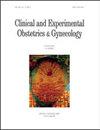Vanishing twin after 12 gestational weeks is associated with adverse perinatal outcomes in in vitro fertilization cycles
IF 0.6
4区 医学
Q4 OBSTETRICS & GYNECOLOGY
引用次数: 0
Abstract
Background: To assess the associations between vanishing gestational age and the adverse perinatal outcomes following in vitro fertilization cycles. Methods: This is a retrospective cohort study conducted in Guangzhou Women and children hospital from January 2011 to January 2019. We identified 350 vanishing twin pregnancies including 54 secondary fetal deaths and 296 singleton deliveries compared to 2080 infants from single gestations. The children detected by transvaginal ultrasonography in gestational week 6. By linking with the hospital’s registries, the main endpoints were gestational age (weeks), birth weight (g), low birth weight (LBW), preterm birth and neonatal malformation rate. Perinatal outcomes were compared among study groups and controls. Results: Of the 350 vanishing twin, there were 15.4% (54) secondary fetal death. Of the 2376 singleton deliveries, 12.5% (296) originated from a twin gestation. In the assessment of perinatal outcome, there were no significant differences between the singleton cohort and vanishing twin before the presence of fetal cardiac activity cohort (VT before CA) and early vanishing cohort. The late vanishing twin group had a higher risk of preterm delivery (P < 0.001) and LBW (P < 0.001). There were no significant differences between all cohorts in assessing neonatal malformation rate (P> 0.05). Conclusion: Vanishing twin after 12 weeks is a predictor of adverse perinatal outcome. The couples with a viable fetus or a non-viable fetus and an empty gestational sac in early pregnancy (<12 weeks) have a similar outcome as the baby from a singleton delivery without vanishing.在体外受精周期中,12孕周后消失的双胞胎与不良围产期结局相关
背景:评估妊娠期消失与体外受精周期后不良围产期结局之间的关系。方法:采用2011年1月至2019年1月在广州妇幼医院开展的回顾性队列研究。我们确定了350例消失的双胎妊娠,包括54例继发性胎儿死亡和296例单胎分娩,与单胎妊娠的2080例婴儿相比。孕6周患儿经阴道超声检查。通过与医院的登记处联系,主要终点是胎龄(周)、出生体重(g)、低出生体重(LBW)、早产和新生儿畸形率。对研究组和对照组的围产儿结局进行比较。结果:在350例消失双胞胎中,继发性死胎占15.4%(54例)。在2376例单胎分娩中,12.5%(296例)为双胎妊娠。在围产期结局的评估中,单胎队列和胎儿心脏活动前消失的双胞胎队列(CA前VT)和早期消失的队列之间没有显著差异。晚消失双胞胎组早产(P < 0.001)和低体重(P < 0.001)风险较高。所有队列在评估新生儿畸形率方面差异无统计学意义(P < 0.05)。结论:12周后消失的双胞胎是不良围产期结局的预测因子。妊娠早期(<12周)有活胎或无活胎且孕囊空的夫妇,其结果与单胎分娩的婴儿相似,且没有消失。
本文章由计算机程序翻译,如有差异,请以英文原文为准。
求助全文
约1分钟内获得全文
求助全文
来源期刊
CiteScore
0.50
自引率
0.00%
发文量
241
审稿时长
1 months
期刊介绍:
CEOG is an international, peer-reviewed, open access journal. CEOG covers all aspects of Obstetrics and Gynecology, including obstetrics, prenatal diagnosis, maternal-fetal medicine, perinatology, general gynecology, gynecologic oncology, uro-gynecology, reproductive medicine, infertility, reproductive endocrinology, sexual medicine. All submissions of cutting-edge advances of medical research in the area of women''s health worldwide are encouraged.

 求助内容:
求助内容: 应助结果提醒方式:
应助结果提醒方式:


